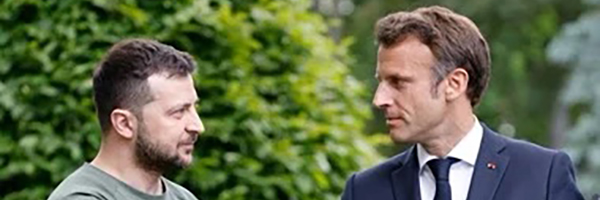Ukraine Is Losing the War, and So Is Europe
Europe has been trying for years to diversify its energy sources but it did not have a comprehensive contingency plan to counteract the impact of abruptly severing access to Russia’s oil and gas since the beginning of the Ukraine war. European politicians have grossly exaggerated the substitution potential of other energy sources (like LNG) and are facing the need to accept alternatives that not too long ago were considered politically unpalatable, like the reopening of coal production in Germany.
How this gross miscalculation took place? Clearly, the European leadership has been unable to foresee the true economic consequences in Europe and beyond of the economic war unleashed against Russia. One explanation for the boldness and self-confidence surrounding the European standing against Russia at the beginning of the war was a strong belief that the combination of anti-Russian sanctions and military support to Ukraine would cause a significant weakening of Russia’s political, social and military standing leading to its defeat. This explains for instance bold statements that the war would only be solved in the field as it was confidently said by the EU’s foreign affairs representative back in March.
It can be argued that the wrong assessment on the war outcome has its roots in faulty US-British intelligence which forecasted Russia’s defeat through economic warfare and, therefore, a limited impact of sanctions on Europe. This not being the case has now made European leadership to scramble for solutions. Meanwhile, the political fallout is already taking place, with Britain and Italy’s prime ministers being the most visible casualties as victims of domestic political events unleashed by their own Russian sanctions. More importantly, it doesn’t seem that the remaining European leadership (led by von der Leyen, Macron and Scholz) is willing to change course without losing significant credibility.
On the other hand, dissenting and unorthodox European political views are sounding louder, as Hungarian prime minister Orban’s recent speech where he boldly mentioned that Russian sanctions and arming Ukraine have failed, Ukraine can’t win the war, the more weapons go to Ukraine the more territory it will lose and that the West should stop arming Ukraine and focus on diplomacy.
At the heart of Europe’s current troubles is its inability to balance its economic and security interests with enough autonomy to be able to look after its own interests. European ambiguity is not new, has its roots on the post-World War II architecture and the aftermath of the collapse of the Soviet Union, and in relation to Ukraine it manifested in its ineptitude to enforce the Minsk agreements that clearly offered a Russo-Ukrainian peace path but were unable to be enforced by France and Germany due to relentless US and Ukrainian pressure.
It seems that only significant political alterations in the European countries that matter — namely France, Germany and Italy — will allow a meaningful change of course from the current path of confrontation with Russia and ultimately economic self-destruction. Otherwise, any political initiative towards solving the war will be left in the hands of Russia and the United States and, if that is the case, any lasting agreement will not have European interests at heart. It would be tragic that a core European problem like the Ukraine war is finally solved through the dealings of an Euro-Asian and an American power.
*
Oscar Silva-Valladares is a former investment banker that has lived and worked in North and Latin America, Western & Eastern Europe, Saudi Arabia, Japan, the Philippines and Western Africa. He currently chairs Davos International Advisory, an advisory firm focused on strategic consulting across emerging markets.
Featured image is from The Ron Paul Institute for Peace and Prosperity

 Oscar Silva-Valladares, Global Research, July 28, 2022 — Beyond the damage in Ukraine, the war also has significant casualties in the rest of Europe as the continent is losing its most competitive energy supplies, compromising the region’s manufacturing edge and accelerating an inflation wave that through higher energy costs will severely affect the wellbeing of its population this coming winter.
Oscar Silva-Valladares, Global Research, July 28, 2022 — Beyond the damage in Ukraine, the war also has significant casualties in the rest of Europe as the continent is losing its most competitive energy supplies, compromising the region’s manufacturing edge and accelerating an inflation wave that through higher energy costs will severely affect the wellbeing of its population this coming winter.